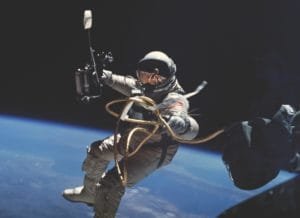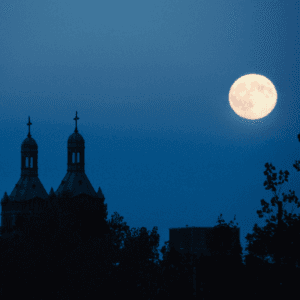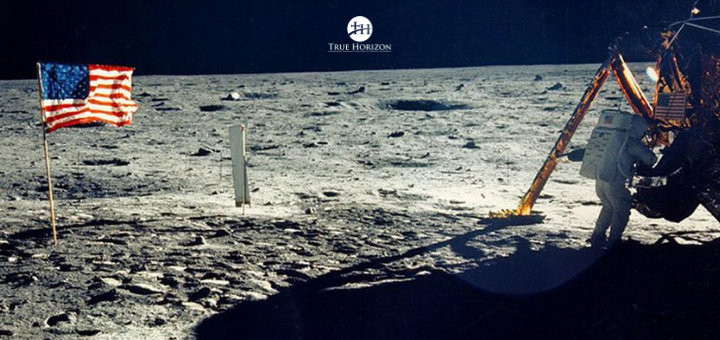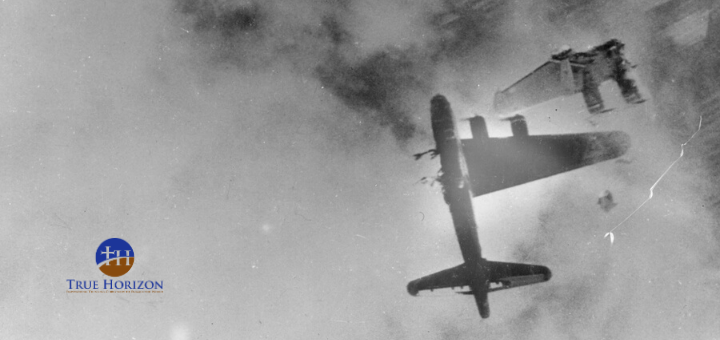Apollo 11 and The Human Spirit
Fifty years ago, at 10:56 PM Eastern time, Neil Armstrong and Buzz Aldrin became the first human beings to set foot on another heavenly body. I was a nine-year-old little boy playing Monopoly with my parents. They let me stay up that night. And together we watched what to this day I consider to be the greatest achievement in human history — the journey of Apollo 11. But that accomplishment was about more than the triumph of human ingenuity, technology, and bravery. It was about the uniqueness of the human spirit.
“One small step for [a] man; one giant leap for mankind.”
The Harrowing Backdrop
It would be many years later before I would learn some things about what went on that night that I never knew while it was happening:
- Navigation and speed errors put the Lunar Excursion Module (LEM) 4 miles away from its intended landing spot.
- Looking out the window, Neil Armstrong saw that the autopilot was taking them toward a location on the lunar surface that was littered with giant boulders
- Neil Armstrong had to make a split-second decision to find a different place to set the Lunar Module (LEM) down; he had to disconnect the autopilot to make that maneuver.
- Every time Armstrong had flown the LEM manually in training, he crashed. In fact, he had to eject from the LEM trainer a year before the Apollo 11 mission for just that reason.
- During their descent to the lunar surface, Armstrong and Aldrin received two alarms — system warnings that they had never seen before in training.
- Buzz Aldrin was poised to abort the landing within seconds of touchdown.
- When Armstrong and Aldrin finally touched down on the moon, they had less than 30 seconds of fuel remaining.
Astronauts On The Edge
The history that defined NASA’s quest to put a man on the Moon was littered with test pilots crashing airplanes and death-defying feats of heroism. Most people probably remember the tragedy of Apollo 1. Astronauts Gus Grissom, Roger Chaffee, and Ed White died in a fire during a test run on the launchpad at Cape Canaveral. But in their book, Moon Shot, Alan Shepard and Deke Slayton chronicle much more than that. And most of the events they recount are things that none of us ever knew anything about.
 During a Gemini 9 mission spacewalk, astronaut Gene Cernan had to deal with a tangled tether, low oxygen, a fogged-up visor, and a clumsy backpack he was testing. Things went from bad to worse. He was having trouble moving, breathing, and maneuvering himself back to the cockpit.
During a Gemini 9 mission spacewalk, astronaut Gene Cernan had to deal with a tangled tether, low oxygen, a fogged-up visor, and a clumsy backpack he was testing. Things went from bad to worse. He was having trouble moving, breathing, and maneuvering himself back to the cockpit.
His fellow astronaut, Tom Stafford, recalled the words of senior astronaut Deke Slayton in a private conversation before the launch. When discussing the spacewalk portion of their mission, Slayton told Stafford, “Look, Tom, what Gene’s going to do out there is pretty risky. If he’s outside and he’s in trouble and, if for some reason the spacecraft is in trouble, short of fuel or something, and well, if there’s no chance of getting him back in … I think you understand. If that kind of thing happens, you’ve got to cut him loose.”
Stafford was on the brink of doing just that when Cernan was finally able to force himself back into the Gemini capsule. Gene Cernan had spent two hours and nine minutes outside the spacecraft not knowing if he would ever return to Earth.
Why Do We Do These Things?
There are plenty of other hair-raising stories. And there are plenty of reasons to talk about the 50th anniversary of the first man to step on the Moon. But here’s my question: Why?
Why do we do these things? What is it in human beings that motivates them to risk their lives to take a Conestoga wagon across North America, set sail on an ocean not knowing what lies on the other side, or lock themselves inside an aluminum can atop a tower of fire and fuel to rocket themselves to the Moon?
How do human beings imagine things that never existed … and then create them?
Why do we pursue the impossible? What makes us so different from every other creature on the planet?
The Uniqueness of Humanity
Some would say we do these kinds of things because we are creatures who have souls. That having a soul is what makes us special.
There is no doubt that the physical world cannot explain the soul. It is evidence of the supernatural. It’s what differentiates life from non-life. And it is true that the immaterial soul is a characteristic of a life that displays mind, will, and emotion. But among living things, the soul is not all that unique. Even my dog has a mind, a will, and emotion.
But my dog could never consider the concept of space travel, let alone build a spaceship and ride it to the Moon. And my dog would certainly never do what Buzz Aldrin did when he got there.
Communion On The Moon
There is another significant thing that happened on that night in 1969 that most of us knew nothing about. It occurred after the LEM had landed on the Moon and before Armstrong and Aldrin stepped out onto the lunar surface. Buzz Aldrin conducted a ceremony. He took a wafer and some wine and celebrated the Christian sacrament of communion on the Moon:
“Aldrin had originally planned to share the event with the world over the radio. But the atheist activist Madalyn Murray O’Hair had recently sued NASA after Apollo 8 astronauts read the Book of Genesis during a broadcast made on Christmas Day 1968, when they became the first humans to orbit the moon. O’Hair’s case claiming that the astronauts had violated the constitutional separation between church and state was dismissed. Yet NASA was still wary of causing more controversy. Aldrin says his fellow astronaut Deke Slayton, who ran the Apollo 11 flight crew operations, told him to tone down his pre-communion message. ‘Go ahead and have communion, but keep your comments more general,’ Slayton advised.”
So he did. The first words read from the Moon were from John 15:5. They were the words of Jesus. But the world never heard them.
The Spiritual Nature of Man

Only humans would take communion on the Moon. That’s because we have more than just a soul. We have a spiritual nature. It gives us the desire and ability to seek God and communicate with Him. We’ll even do it while we’re sitting on the Moon.
The legacy of Apollo 11 is about more than science, and technology, and bravery. It’s about the triumph of the human spirit. It’s about creatures who do more than build spaceships and cheat death. We build churches with spires that point to the heavens. And we do it because we know “the heavens declare the glory of God.”



